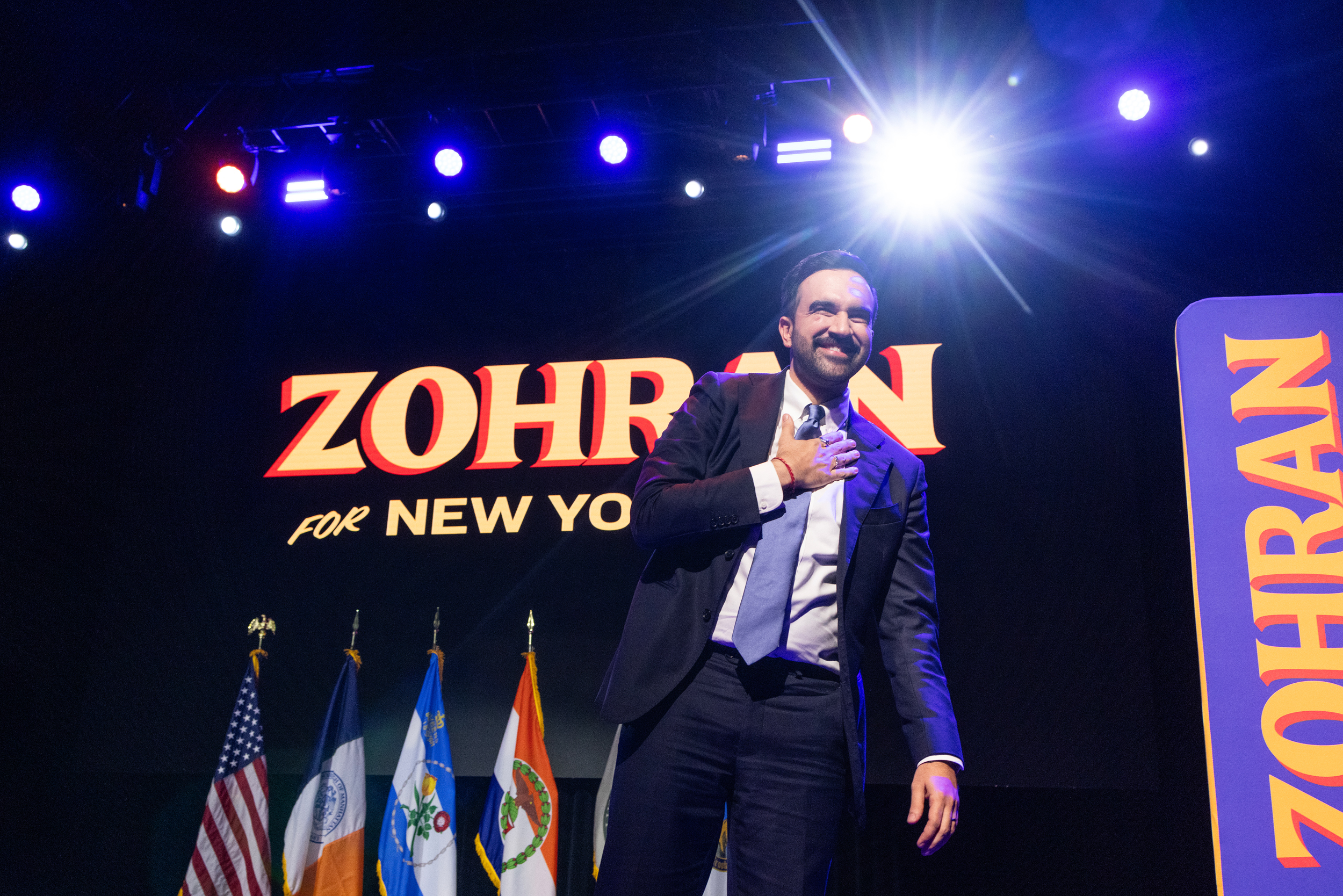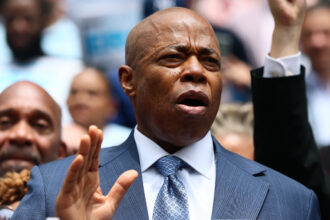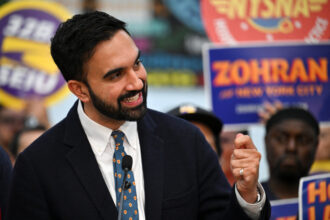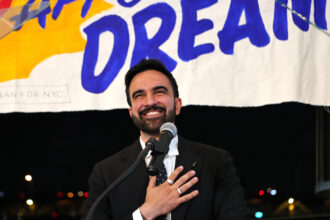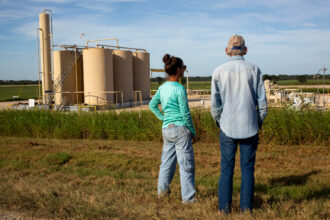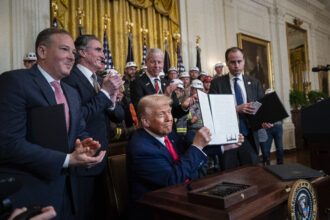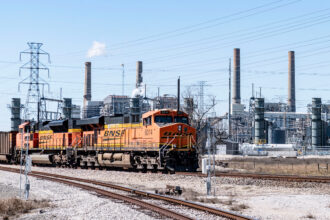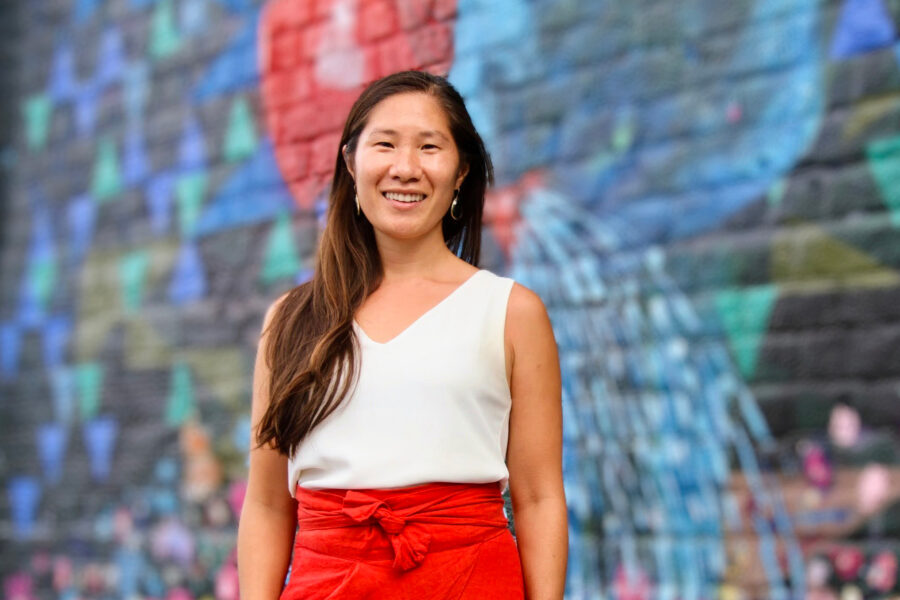It was 10 p.m. on election night. Twenty minutes prior, most news organizations had called the New York City mayoral race for state assemblymember Zohran Mamdani, a previously obscure politician who rose to power through an unrelenting campaign for affordability.
In a long line to enter Mamdani’s election night party at the Brooklyn Paramount, Naftali, 31, who declined to give his last name, was in good spirits.
“I’m feeling incredible,” he said. “I’m so hopeful about the future of our city and of American politics.”
Naftali had door-knocked for Mamdani since December. Though the campaign wasn’t laser-focused on climate issues, he felt that many of Mamdani’s promises to improve transit, such as making buses “fast and free,” intersect with environmental issues.
Mamdani got more than a million votes and a significant portion of them came from young New Yorkers and tenants who could benefit from his “freeze the rent” stance on rent-stabilized housing.
Mamdani has made many promises—from building 200,000 new affordable housing units over ten years to universal childcare. He has also vowed to address climate issues, including in his “Green Schools for a Healthier New York City” policy proposal, which would renovate 500 schools across the city, install renewable energy infrastructure and heating and cooling appliances and turn their schoolyards into green spaces that will limit flooding by absorbing stormwater.
“The public schools are distributed perfectly around the five boroughs to be able to be clean energy hubs for storm resilience,” said Kim Fraczek the executive director of Sane Energy, a nonprofit organization that is advocating for the replacement of gas infrastructure with renewable energy. “We’re really excited about that.”
Mamdani has also pledged to uphold Local Law 97, a city law that imposes slowly escalating limits on large buildings’ greenhouse gas emissions, forcing landlords to pay a fine if they emit more than their fair share.
Co-ops in particular have struggled with the cost of this, though Mamdani has a plan to help them comply by increasing investments in city programs designed to support them and expanding existing tax breaks.
During his time as a state assemblymember, Mamdani consistently opposed utility rate hikes and plans for new gas infrastructure in the state. He fought aggressively against a proposed gas power plant in Astoria, along with Fraczek’s organization.
The Department of Environmental Conservation ultimately denied the air permit of NRG, the gas company. Fraczek hopes that the new mayor will take a strong stance against the construction of the Northeast Supply Enhancement pipeline, which would be built off the coast of Staten Island and the Rockaways in Queens.

The pipeline has been rejected three times by the state, but made a comeback this year after President Trump’s push to expand gas infrastructure nationwide.
“We really don’t need it,” said Lara Croushore, the chief strategy officer at the city’s Office of Climate and Sustainability under former mayor Bill de Blasio and now the head of climate at SecondMuse, an innovation firm that works on climate issues
Housing costs and availability were among the main pillars of Mamdani’s campaign. New Yorkers also voted in favor of three ballot proposals related to zoning law, which could increase the amount of housing and the speed at which it is built in the city—but could also curtail the power of local city council members over new developments in their districts.
Mamdani plans to increase the number of affordable units in the city, and Croushore hopes he will ensure they are built sustainably and “resilient to the impacts of climate change.” Many of the city’s neighborhoods are flood-prone, and an increasing number of homes are likely to be at risk as climate change intensifies storms and brings more rainfall.
Mamdani will face no shortage of climate change-related and environmental issues—issues such as flooding, extreme heat and air pollution are likely to emerge under his leadership. But on election night at least, the thrill of his win was intoxicating enough for his supporters to obscure the work ahead.
At a crowded bar in Fort Greene, a mere 10-minute walk from Mamdani’s election night party, deafening cheers erupted as Mamdani took the stage for his victory speech, visible on a half-dozen televisions behind the bar.
“We are breathing in the air of a city that has been reborn,” he said. “I will wake each morning with a singular purpose: to make this city better for you than it was the day before.”
About This Story
Perhaps you noticed: This story, like all the news we publish, is free to read. That’s because Inside Climate News is a 501c3 nonprofit organization. We do not charge a subscription fee, lock our news behind a paywall, or clutter our website with ads. We make our news on climate and the environment freely available to you and anyone who wants it.
That’s not all. We also share our news for free with scores of other media organizations around the country. Many of them can’t afford to do environmental journalism of their own. We’ve built bureaus from coast to coast to report local stories, collaborate with local newsrooms and co-publish articles so that this vital work is shared as widely as possible.
Two of us launched ICN in 2007. Six years later we earned a Pulitzer Prize for National Reporting, and now we run the oldest and largest dedicated climate newsroom in the nation. We tell the story in all its complexity. We hold polluters accountable. We expose environmental injustice. We debunk misinformation. We scrutinize solutions and inspire action.
Donations from readers like you fund every aspect of what we do. If you don’t already, will you support our ongoing work, our reporting on the biggest crisis facing our planet, and help us reach even more readers in more places?
Please take a moment to make a tax-deductible donation. Every one of them makes a difference.
Thank you,


